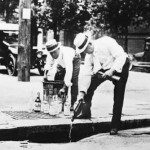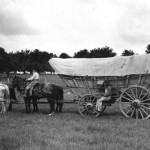During the last century, a preacher named Billy emerged as a world-renowned evangelist. But it’s not the Billy one might imagine. As if predestined by his surname, Billy Sunday brought “old time religion” to an estimated 100 million people without the benefit of television or electric amplification. Sunday’s career was intertwined with that of Winona Lake, in Kosciusko County, a mecca of religious and cultural activity from the 1890s through the 1930s. The largest personal property tax payer in that northern Indiana county for many years, William Ashley Sunday began life in humbler circumstances.
Born in Ames, Iowa in 1862, Sunday wound up in an orphanage at a tender age when his widowed mother could no longer care for him. By age fourteen, he’d struck out on his own, supporting himself as a farmhand and a firefighter, and playing baseball recreationally. In 1883, his talent as a outfielder won him a spot on the Chicago White Stockings, the defending National League Champions. Known for his speed and his base-stealing skills, Sunday played for the Pittsburgh and Philadelphia teams before responding to a different calling. Having converted to Christianity several years earlier, in 1891 Billy Sunday turned down a lucrative baseball contract to accept an 83-dollar-a-month ministerial post with the Chicago YMCA.
After apprenticing for a few years with the evangelist J. Wilbur Chapman, Sunday set off on his own circuit of tent revivals, inviting participants to “hit the sawdust trail” to salvation. (Sawdust was often scattered across the floor to dampen the noise of shuffling feet and to minimize dust.) The former athlete drew upon his physical vitality and popular appeal to pack the house. One of Sunday’s better-known sermons decried alcoholism—“ Whiskey and beer are all right in their place,” he famously conceded, “but their place is in hell.” The passage of the Eighteenth Amendment establishing Prohibition in 1919 has been credited in part to Sunday’s exhortations on the subject.
With his wife Helen—better known as “Nell” or “Ma Sunday”—managing his peripatetic career, Sunday soon came to command crowds so enormous that wooden tabernacles were required for his month-long appearances. The structure built at 168th Street and Broadway in New York—where he held at two-month meeting in 1917— accommodated 18,000. The Sundays amassed a fortune, but lived simply, making their home in a nine-room bungalow in Winona Lake they named “Mount Hood”.
The Winona Chautauqua was the beneficiary of a regular portion of Sunday’s earnings, many of which came through the evangelist’s appearances at the Billy Sunday Tabernacle, built there in 1920. Although the tabernacle was demolished in 1992, artifacts and memorabilia are on view at the Billy Sunday Home and Visitors Center at Winona Lake. Billy Sunday passed away on a visit to Chicago on November 6, 1935.






















